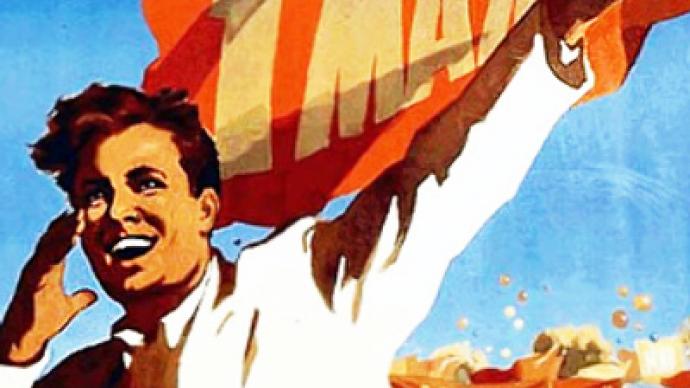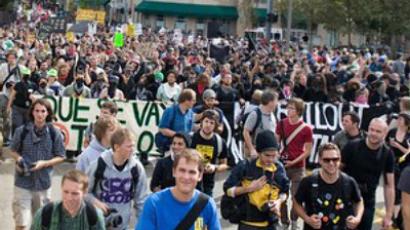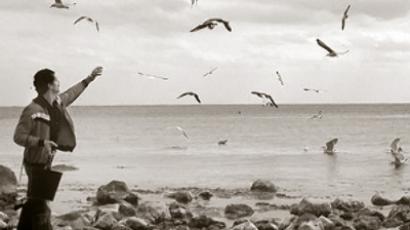May Day gradually loses political flavor

Spring and Labor Day has been celebrated with marches and rallies across Russia for and against the government. However, the majority of people just wanted to rest up.
In Russia, May Day, known as International Workers Day, was celebrated illegally by revolutionaries until 1917. In Soviet times, it became one of the most important holidays. The leadership of the Communist Party used to greet those marching on Red Square from atop Lenin’s Mausoleum.
Since the Soviet era, May Day demonstrations and marches attract a lot of people. However, if in the Soviet Union they were held rather to support the Communist Party’s policies, now many opposition parties and groups use the holiday to express their views.
Continuing the tradition of recent years, the Moscow Federation of Trade Unions has organized the largest march in Moscow.
The ruling United Russia party and three opposition parties represented in the parliament – the Communist Party, Fair Russia and the Liberal Democratic Party of Russia – have organized their own rallies.
However, United Russia also joined the march of trade unions. It is not just a symbolic act, chairman of the party’s supreme council and speaker of the State Duma Boris Gryzlov noted, adding that "the party works closely with the Federation of Independent Trade Unions.”
The Communists have held a march and meeting at Teatralnaya Square. “The words ‘peace’, ‘labor’, and ‘May’ encourages us today to fight the capitalist reaction,” the party’s leader Gennady Zyuganov said. He pledged to spare no effort in fighting for the ideals of “socialism and friendship of peoples.”
Marches and rallies were also held in most big cities across the country. In Moscow, the city authorities have permitted several rallies of opposition parties and movements. Their participants used the holiday as a good reason to summon their supporters and protest against the government’s economic and social policies.
Some rallies, organized by “groups of citizens,” were devoted to different issues ranging from protecting labor and social rights of citizens to ecology.
However, the holiday that is now called “Spring and Labor Day” is gradually ceasing to be a day of rallies for Russians, recent polls say. Only 11% of those surveyed by the Levada Analytical Center were ready to take part in protest rallies during the holiday. The respondents were mainly pensioners, citizens at the age of 40-55 and those living in small towns.
According to the poll conducted by the center on April 16-19 in 44 regions, Russians were unwilling to take part in protest rallies or events to support the government. Among those surveyed, 63% did not want to support the current policies and 76% did not intend to spend the holiday protesting against these policies.
Many doubt that May Day rallies are the best way of protecting social rights. At the same time, 53% of respondents said they would like to celebrate May Day in one way or another.
However, a lot of Russians traditionally spend holidays with their families and go out to the countryside. This even prompted some politicians to propose extending the holidays in May at the expense of long New Year celebrations. The supporters of the idea argue that people will have more time to work on their plots of land.
However, the Federal Labor and Employment Agency (Rostrud) considers this inexpedient. Such draft bills appear regularly, but they do not become laws because trade unions, employers and the government cannot come to an agreement, the agency’s deputy head Ivan Shklovets noted.
Russia has enough holidays and days off, he believes. “I think that now the number of time off and holidays is normal and optimal," Shklovets said.
The Health and Social Development Ministry has also opposed the extension of May holidays. Answering to supporters of an additional day to work in gardens, the ministry’s officials stressed that climatic conditions in many regions make it impossible at this time of the year.
So, many people prefer to celebrate the holiday at home or just rest rather than work on plots of land. There are also many, who simply don't understand what exactly to celebrate on this day.
Almost 40% of those polled by the All-Russian Opinion Research Center (VTsIOM) consider this holiday the day of spring rather than labor. Only 31% of respondents celebrate on May 1 the Day of International Solidarity of Workers, the name of the holiday that existed in Soviet times.
Almost a quarter of those polled on April 24-25 in 42 regions by VTsIOM consider the holiday just another day off. Only 2% describe it as a reason to fight for social rights of different groups of people.
Sergey Borisov, RT














